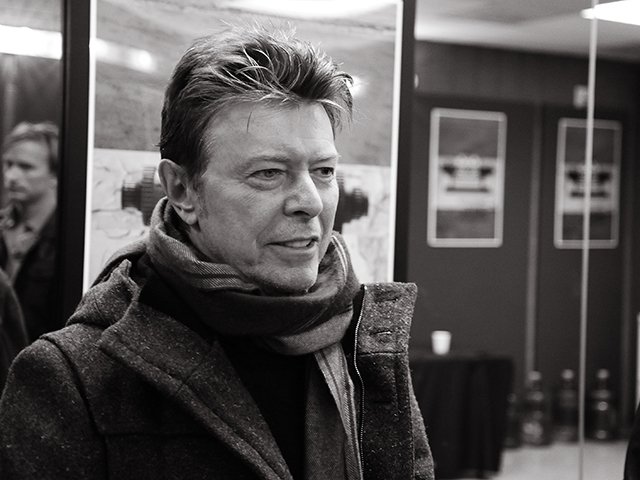Bowie estate sells songwriting rights to Warner
Updated | By AFP
The Bowie deal includes hundreds of songs spanning the glam rock pioneer's six-decade career, including "Space Oddity," "Changes," "Life on Mars?" and "Heroes."

David Bowie's estate has sold the publishing rights to his "entire body of work" to Warner Chappell Music, the company said Monday, the latest massive deal in a roaring song rights purchasing boom.
Warner Chappell did not reveal financial terms of the agreement, but according to trade publications the price tag is estimated at upwards of $250 million.
Recent years have seen a series of blockbuster music rights acquisitions by corporations -- including from superstars Bruce Springsteen, Bob Dylan and Tina Turner -- a trend driven by the anticipated stability of streaming growth combined with low interest rates and dependable earning projections for time-tested hits.
The Bowie deal includes hundreds of songs spanning the glam rock pioneer's six-decade career, including "Space Oddity," "Changes," "Life on Mars?" and "Heroes."
"All of us at Warner Chappell are immensely proud that the David Bowie estate has chosen us to be the caretakers of one of the most groundbreaking, influential, and enduring catalogs in music history," said Guy Moot, head of WCM, in a statement.
"These are not only extraordinary songs, but milestones that have changed the course of modern music forever."
Warner now houses Bowie's work as a songwriter as well as a recording artist.
The owners of a song's publishing rights receive a cut in a number of scenarios, including radio play and streaming, album sales, and use in advertising and movies. Recording rights govern reproduction and distribution.
Warner Music Group has handled much of Bowie's recorded catalog since 2013, last year adding his recordings from 2000 to 2016 to the fold.
The announcement comes days before Bowie's birthday on January 8, when he would have turned 75, and the sixth anniversary of his death on January 10.
- Lucrative asset class -
Music catalogs have always changed hands but the current publishing sales frenzy has escalated rapidly, with financial markets increasingly drawn to lucrative music portfolios as an asset class.
Bruce Springsteen's publishing and recorded music rights recently went to Sony for a staggering $500 million, with Bob Dylan also selling his full publishing catalog to Universal for hundreds of millions of dollars.
The past year has seen other major acquisitions including from Stevie Nicks, Paul Simon, Motley Crue, The Red Hot Chili Peppers and Shakira.
The flurry of sales comes amid a wider conversation over artists' ownership of the work, amplified in large part by Taylor Swift, who has found resounding success as she makes good on her vow to re-record her first six albums so she can control their master recording rights.
"If I'm a successful artist right now, I'm looking to own everything I could possibly own so I could sell everything off at some later date," music analyst Alan Cross told AFP, while also defending older artist' rights to cash in on their own work.
Such sales are useful for estate planning and perhaps more lucrative in the long-term, Cross said: in the United States, making a lump-sum sale also means artists are taxed at the capital gains rate, which is much lower than the income tax they or their estates would pay on regular royalty checks.
- 'Memories and feelings' -
Jeff Jampol, whose company manages legacy artists and their estates including the Doors and Janis Joplin, said the right moment to cash in is of course a gamble, as most catalogs "gain value over time."
"It is cyclical -- but if you're in your 70s, or you're making succession plans, do you want to wait for the next cycle?" he told AFP.
But could such sales alter how fans engage with the music of these artists?
Maybe temporarily, Jampol said, but "long term? I don't think so."
"Music encompasses and encapsulates memories and feelings," he said. "And those things don't change."
The company that's publicized a large share of the recent explosion in sales is Hipgnosis Songs Fund, a British investment and management company.
In its interim report released in September 2021, Hipgnosis said its rights vault has grown to 146 catalogues and 65,413 songs -- a value the company places at $2.55 billion.
For Jampol, the concern that looms largest over the recent flurry of transactions is that hedge funds, pension funds, and private equity firms now own seminal art.
"What do they know about soul and poetry and art and what are they going to commit to from an artistic point of view?" he said.
"It's not just numbers on pages," Jampol continued. "It's music that created very special feelings & emotions -- and those shouldn't always be for rent to the highest bidder."
Show's Stories
-
Woman shows how many Easter eggs she bought
How much is too much when it comes to buying Easter eggs?
The Workzone with Alex Jay 1 day, 10 hours ago -
Enjoy a rainbow Easter weekend at Melrose Arch
This weekend, Melrose Arch transforms into a wonderland of colour and f...
The Workzone with Elana Afrika-Bredenkamp 1 day, 10 hours ago